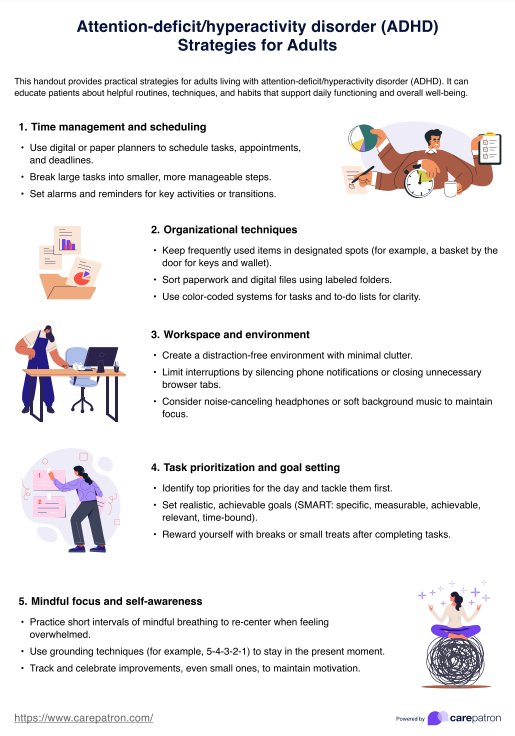What are ADHD strategies?
ADHD strategies are practical approaches designed to help adults manage symptoms, stay focused, and handle everyday life tasks more effectively. They combine routine, self-awareness, and supportive tools to address common challenges like impulsive behavior, feeling overwhelmed, or juggling too many projects. By improving cognitive performance and reducing stress levels, these methods can enhance overall well-being and productivity. Here are some helpful strategies:
Time management and scheduling
Maintaining a regular sleep-wake schedule and planning out important tasks can help clients minimize disruptions. Encourage them to break tasks into smaller tasks, set electronic reminders and use alarms or timers to remain on track. Prioritizing tasks in a structured manner prevents overwhelm and ensures steady progress.
Organizational techniques
Keeping a mail routine, sorting junk mail promptly, and organizing belongings in labeled folders or containers create a clutter-free environment. Such structures minimize distractions and save time, making it easier for adults with ADHD to navigate daily responsibilities and sustain focus.
Workspace and environment
Designating a dedicated workspace with minimal visual or auditory interruptions helps eliminate competing stimuli. Turning off electronic devices or notifications during important tasks supports sustained attention, reducing the risk of impulsive behavior driven by outside distractions.
Task prioritization and goal-setting
Identifying top priorities and breaking big tasks into stages reduces feeling overwhelmed. Setting smaller, specific goals fosters achievement and motivation while avoiding impulse purchases or impulsive decisions ensures each step aligns with the individual's personal objectives.
Mindful focus and self-awareness
Engaging in mindfulness techniques—such as breathing exercises or grounding practices—keeps attention in the present moment, helping regulate emotions and impulses. Pairing mindfulness with physical activity, like brief exercise or stretching, further stabilizes mood and energy.
Routine and consistency
Consistently following daily habits (for example, a set time for eating or working) fosters predictability and balance. This approach manages adult ADHD effectively by establishing structure, limiting decision fatigue, and preventing too many projects from accumulating.
Stress management and emotional regulation
Relaxation activities—such as yoga, reading, or journaling—provide outlets for emotional release and reduce stress levels. Seeking professional help when needed can equip individuals with compensation strategies to handle more challenging emotional states or situations.
Support systems and resources
Sharing difficulties and achievements with friends, family, or support groups can offer guidance and encouragement to individuals with ADHD. The presence of supportive networks helps maintain accountability, fosters resilience, and ensures ongoing motivation for managing ADHD.












